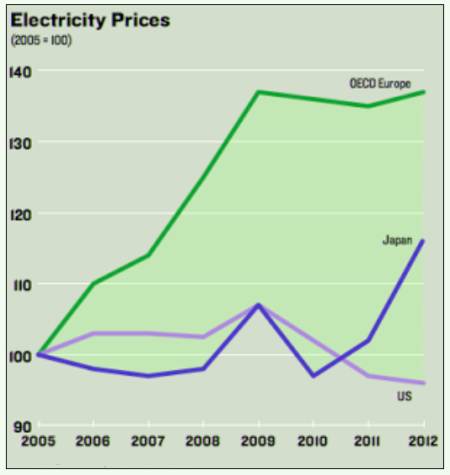
WIND BLOWS ENERGY PRICES UPWARDS
Take a look at the graph below, which shows what has happened to energy prices since 2005..

From an assumed common point in that year, we can see that electricity prices in Europe are now 37 per cent higher than those in the US, and 20 per cent higher than those in Japan. It is becoming clear that unless something is done about energy prices in Europe, industry in the region is finished. There has been a steady stream of announcements from European manufacturers recently about plans to build new production facilities outside the EU.
For 20 years, energy policy in Europe has been hijacked by the EU’s fixation with climate change. But at the most recent meeting of the European Council, there was, at last, a recognition that the EU’s bid to lead the world in “de-carbonising” is leading the European economy towards meltdown.
As a result of the demonising of hydrocarbon fuels, an obsession with wind farms and ever-rising taxes on any economic activity which emits CO2, European firms have been forced either to move their operations outside the European Union, or to shut down altogether. We saw it happen here in Britain recently with the closure of our last remaining major aluminium smelter, at the cost of 500 jobs.
Nevertheless there is still no sign in the UK that the 'Climate Change Act' (to which Ed Miliband committed us some years ago, and which has led to this situation) will ever be repealed.
28 May 13
FOOTNOTE from 2011 'reality checkpoint' page:
NEW EMISSIONS REGULATIONS CAUSE ALUMINIUM FACTORY TO CLOSE
Rio Tinto Alcan is closing its Northumberland aluminium smelting plant in north-east England because of EU climate legislation. The closure of the decades old smelting plant is devastating for an area with already high unemployment; 500 jobs will be lost.
The company remains profitable, in spite of increasing energy costs. But in 2013 the plant faces a rise of around £56 million to enable it to comply with new European and UK carbon legislation.
Rio Tinto’s CEO Jacynthe Côté told the London Financial Times, “It is clear that the smelter is no longer a sustainable business because its energy costs are increasing significantly, due largely to emerging legislation.”
It seems that their thermal (shale) power plant does not meet the Large Combustion Plant Directive - Ed. .
28 Nov 2011


big turbines
small turbines